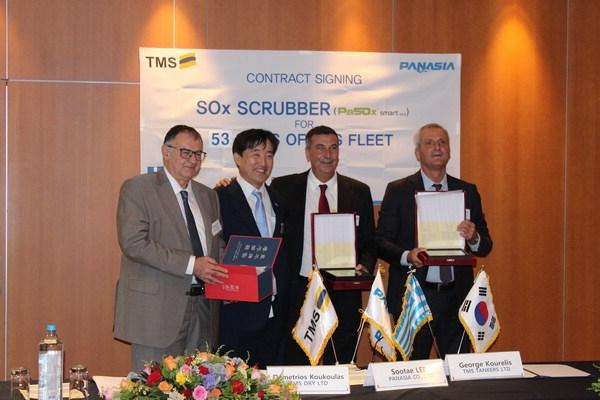
- This is PANASIA
- ESG Management
- History
- Smart PANASIA
- Contact information
 About
About
Check PANASIA introduction,
ESG management, and History
information
- Energy Solutions
- Air Solutions
- Water Solutions
 Eco-friendly Solution
Eco-friendly Solution
About Global environmental
regulation, Hydrogen business,
Air quality, and Water quality
environment solutions
- Product Service
- Service Network
- Customer Service
 Customer Support
Customer Support
Check the Panasia’s
after service
- About
- Eco-friendly Solution
- Customer Support
- Media
NEWS
Title
PANASIA’s “desulfurization technology” penetrates the European market
Date
2018-07-08
Hit
1349
File
PANASIA’s “desulfurization technology” penetrates the European market

PANASIA, a Busan-based marine equipment supplier, successfully signed a scrubber supply contract worth 75 billion won with a Greek shipowner.
Scrubbing technology was designed to enable compliance with the sulfur regulations the International Maritime Organization (IMO) started implementing in 2020. The scrubber uses seawater to remove sulfur in ship exhaust gas emissions.
On the 8th, PANASIA announced, “We signed a contract with Greek shipowner TMS Group on the 5th to install scrubbers on 53 vessels for the desulfurization of marine exhaust gases. The contract price totals 72 million dollars.”
- Defeated Norwegian company in the bidding- Contract with Greek shipowner worth 75 billion won- Set to install scrubbers on 53 vessels TMS Group is the second largest shipowner in Greece. PANASIA reportedly competed with and beat a world-renowned Norwegian scrubber manufacturer.
The size of the contract is astounding, but what’s more shocking is that this Busan-based company beat a North European company with advanced scrubbing technology, which drew considerable attention in Greece too.
Soo-tae Lee, CEO of PANASIA, said, “As more global shipping companies have used PANASIA’s scrubbers, we have built more trust for our products. We can also deliver faster, which helped us get a higher score in the evaluation.
An increasing number of inquiries about scrubbers has led PANASIA to expand its facilities at the headquarters and sign contracts with outside suppliers. With its expanded infrastructure, the company can now produce 300 scrubbers each year.
Since scrubbing technology has become the most realistic solution to comply with the IMO’s environmental solutions, it looks like PANASIA will continue to enter into large-scale contracts.
Under the IMO’s environmental regulations, globally operating ships should start reducing sulfur emissions from 3.5% to 0.5% in 2020.
In an effort to meet the new standard, a few solutions were suggested, such as replacing ships with ones powered by environmentally friendly fuels like LNG or using low-sulfur fuel oil. However, there is no appropriate infrastructure in place for LNG supply.
Also, the recent rise in oil prices has led to growing demand for scrubbers, making the use of low-sulfur fuel oil less viable.
PANASIA, already established as a leading scrubber manufacturer in Korea, has inked deals to supply a total of 75 scrubbers for 13 vessels in 2018, 55 vessels in 2019, and 7 vessels 2020.











